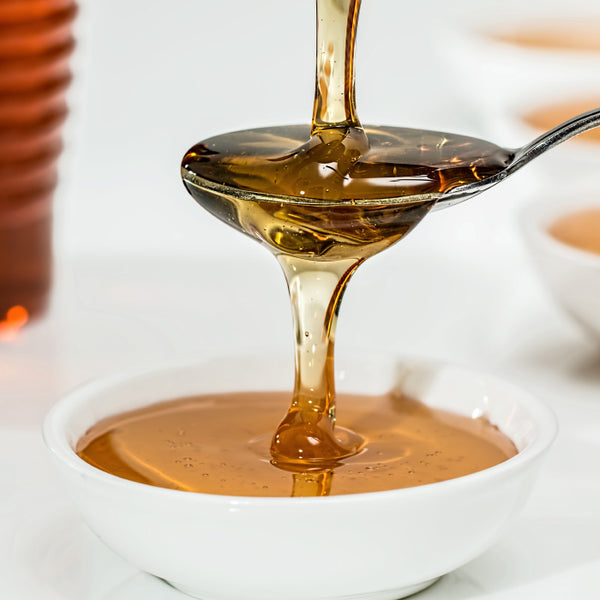Honey bees are hard workers, and we’re lucky to be able to enjoy the fruits of their labor. But just what are the health benefits of beehive honey? Does it do more than just sweeten your meal?
You’ve seen honey at the supermarket and maybe even honeycomb at a farmers market or health food store. You can even add bee pollen to your drink at some smoothie shops. All of these bee products are packed with antioxidants, but not all honey is created equal.
We’ve broken down everything you need to know about beehive honey and other bee products so you can enjoy them mindfully.
What you can eat from a beehive
Bees and their hives produce honeycomb, honey, bee pollen, and propolis. Honeycomb is made up of hexagonal cells made of beeswax, and used by honey bees to store raw honey, pollen, and larvae.
When you see raw honey at a farmers’ market or health store, it means it hasn’t been pasteurized or filtered. You can enjoy a whole piece of honeycomb as a delicious treat, eating the waxy cells and honey within it, or other bee products on their own. Try them on top of yogurt, toast, or with cheese.
Beehive honey is packed with antioxidants and trace nutrients. Raw honey, as opposed to processed honey, is the most beneficial with protein, vitamins, minerals, and enzymes like glucose oxidase. That’s what gives raw, beehive honey its antimicrobial and antibacterial properties. You likely won’t find these benefits in widely produced commercial honey as the heating and filtering process removes them. So look for raw honey if your aim is to pack more nutrients into your diet.
But while raw honey may be filled with great things, it’s still composed of 95-99% sugar! So you should consume it in moderation.

Top Three Health Benefits of Beehive Honey
1. Honey contains antioxidants and nutrients
Honey includes a number of compounds that act as antioxidants in the body. We hear about superfoods like blueberries and pomegranate having high antioxidants, but what is it that antioxidants really do?
Antioxidants reduce oxidative stress in the body by balancing free radicals, which are produced in the metabolic process. An increase in free radicals and oxidative stress can be caused by diet, lifestyle, and even environmental factors like pollution.
By consuming foods high in antioxidants, we can reduce free radicals and therefore oxidative stress that is linked to chronic disease.
Beehive honey also contains vitamins and minerals like calcium, magnesium, potassium, and zinc.
2. Honey is anti-inflammatory and antibacterial
Nothing says “superfood” like the ability to kill bacteria. Honey has been shown to fight off E. Coli and Salmonella and certain types, like Manuka honey from New Zealand, are said to kill staph and digestive bacteria.
Honey has also been shown to soothe sore throats and improve sleep quality better than certain leading cough suppressants and antihistamines.
3. Honey may improve athletic performance
A study at the University of Memphis demonstrated that honey was comparable, or better than glucose or sugar water in maintaining athletes’ endurance. The studies were funded by the National Honey Board, an “industry-funded agriculture promotion group.”
This one requires more research, but we say it can’t hurt to add some honey to your tea.

How to enjoy honey for health
Consider adding honey to your diet just like you would other powerhouse foods such as blueberries, broccoli, nuts, and dark green veggies. Incorporating a mix of all of these foods is good for your overall health and can help your body fend off disease.
If you’re adding honey to your diet, remember that you may lose some of the benefits if you heat or cook it into a recipe. Try no-bake desserts like these honey-sweetened peanut butter bars or a honey mustard salad dressing.
Or, make an amazing honey ginger lemonade or even a classic cocktail made with honey syrup.
Keep the honey flowing
If you’re a lover of beehive honey and all the benefits it offers, you should know that we’re not guaranteed its supply. As climate change, sprawling agriculture, and the use of harmful pesticides continue to increase and become status-quo, we’re seeing the honey bee population decline. The bees that pollinate our food crops, ensure a balanced ecosystem and of course, create delicious honey are under serious threat with 40% of the bee population disappearing in just the span of one winter from 2018-2019.
Even if you don’t love honey, reversing these statistics is vital to life as we know it. For more information on how you can support the honey bee population, read our blog, “How to Save the Bees in 2021.”


 Jul 20, 2021
Jul 20, 2021 Posted by: Carissa Sinclair
Posted by: Carissa Sinclair